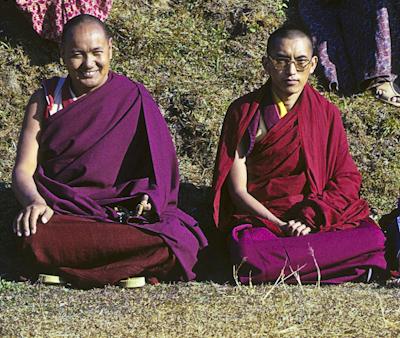FROM THE VIDEO ARCHIVE: The Four Noble Truths
This month from the video archive we present Lama Zopa Rinpoche celebrating the opening of Maitreya Instituut in Amsterdam in 1998 by giving a teaching on the Four Noble Truths and explaining how Dharma centers create the conditions for sentient beings to learn that the source of all happiness and suffering is not outside but inside their minds. Lama Zopa Rinpoche’s teachings on The Four Noble Truths have also been published by Wisdom Publications.
Visit and subscribe to the LYWA YouTube channel to view dozens more videos freely available from our archive. See also the FPMT YouTube channel for many more videos of Lama Zopa Rinpoche’s teachings.
ON THE LYWA PODCAST: The Yoga of Offering Food
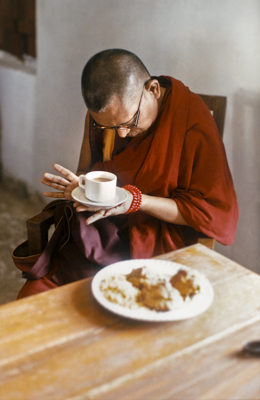 With that continual thought of benefiting other sentient beings, then with every single morsel of food or drop of drink, you collect limitless skies of merit.
With that continual thought of benefiting other sentient beings, then with every single morsel of food or drop of drink, you collect limitless skies of merit.
—Lama Zopa Rinpoche
This month on the LYWA podcast we bring you more teachings by Lama Zopa Rinpoche given at the 36th Kopan Meditation Course at Kopan Monastery, Nepal in 2003. In this session, Rinpoche teaches how and why to make all our meals the practice of Dharma and the cause of enlightenment. Rinpoche explains in detail the three motivations for making food offerings and then joins the students in a food offering practice. Read along with the transcript of these teachings on our website.
The LYWA podcast contains hundreds of hours of audio, each with links to the accompanying lightly edited transcripts. See the LYWA podcast page to search or browse the entire collection by topic or date, and for easy instructions on how to subscribe.
WHAT'S NEW ON OUR WEBSITE
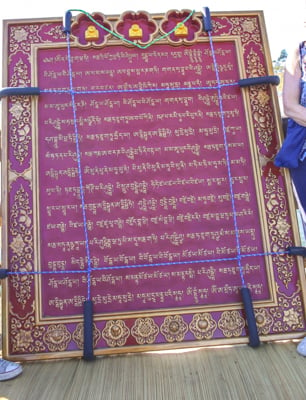 This month we have posted teachings by Lama Thubten Zopa Rinpoche at the 50th Kopan Meditation Course held at Kopan Monastery, Nepal, December 2017. In this series of twelve lectures, Rinpoche discusses many essential lamrim topics and explains that the essence of Dharma is cherishing others. Rinpoche says, “Cherishing others is where all happiness arises from, all temporary and ultimate happiness, all the realizations of the path.”
This month we have posted teachings by Lama Thubten Zopa Rinpoche at the 50th Kopan Meditation Course held at Kopan Monastery, Nepal, December 2017. In this series of twelve lectures, Rinpoche discusses many essential lamrim topics and explains that the essence of Dharma is cherishing others. Rinpoche says, “Cherishing others is where all happiness arises from, all temporary and ultimate happiness, all the realizations of the path.”
This month in our featured short video from FPMT's Essential Extracts series, Lama Zopa Rinpoche advises how to make charity to beggars by remembering the bodhicitta attitude and reflecting on emptiness, thus the action of giving becomes the cause of enlightenment. You can find links to the video here, or visit FPMT’s Essential Extracts webpage to browse the entire collection.
We also have new additions to Lama Zopa Rinpoche's Online Advice Book to share with you:
- Benefiting Others with Namgyälma Mantra: A student was taking the Namgyälma mantra to the top of a mountain to bless the area. Rinpoche offered this advice about the benefits of the mantra.
- Method and Wisdom in Highest Yoga Tantra Practice: Rinpoche gave this advice to a student who asked about the qualifications needed to engage in the Highest Yoga Tantra practices of transcendental wisdom and great bliss.
- Dolgyal and the Guru-Disciple Relationship: A student who had been ordained in the New Kadampa Tradition wrote to Rinpoche about ordination. Rinpoche sent this letter advising how to correctly follow the virtuous friend when we have entered the guru-disciple relationship.
- The Karma of Logging at the Center: Rinpoche wrote this letter to students who had asked about logging in order to earn money.
You can always find a list of all the newly posted advices from Lama Zopa Rinpoche on our website.
More Praise for Big Love
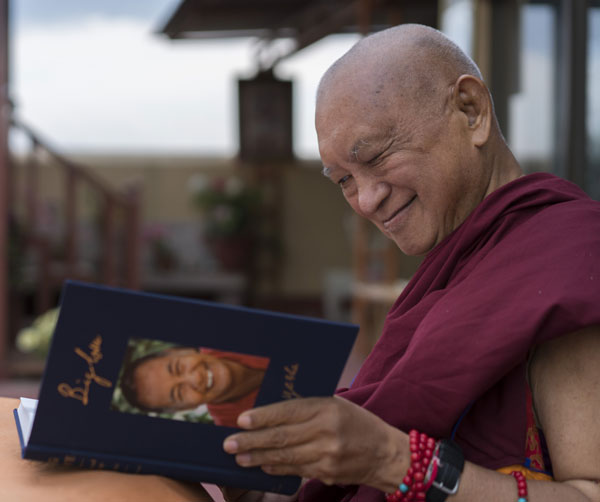 We continue to receive feedback from readers who have been sending tributes, observations and thanks to the author, editors and others who have contributed to the production of Big Love. In this letter, eminent US psychologist Allyn Roberts writes about his friendship with Lama Yeshe, Geshe Sopa, His Holiness the Dalai Lama, Jeffrey Hopkins and others who played key roles in bringing Tibetan Buddhism and practices such as mindfulness to the West. You can read about Allyn and enjoy his story of the Wisconsin silo which inspired Lama’s vision for the Maitreya Buddha Project in India, in Big Love, pp. 443–44 and p. 668.
We continue to receive feedback from readers who have been sending tributes, observations and thanks to the author, editors and others who have contributed to the production of Big Love. In this letter, eminent US psychologist Allyn Roberts writes about his friendship with Lama Yeshe, Geshe Sopa, His Holiness the Dalai Lama, Jeffrey Hopkins and others who played key roles in bringing Tibetan Buddhism and practices such as mindfulness to the West. You can read about Allyn and enjoy his story of the Wisconsin silo which inspired Lama’s vision for the Maitreya Buddha Project in India, in Big Love, pp. 443–44 and p. 668.
January 20, 2021
Dear Ms. Hulse and Dr. Nick,
What a gift your two-volume encyclopedia of Lama Yeshe’s life is. What a labour of love! I knew Geshe Lundub Sopa well, not as a devotee, but as a friend. Through him and my relationship with Jeffrey Hopkins, I got to know the Dalai Lama, Ling Rinpoche, Geshe Rabten and Lama Yeshe. I am in my nineties now and doing the kind of summing up the end life asks. It’s such a joy to see all these old friends (your compilation of photos must have been a Herculean task) and to understand more about their lives in the context of Buddhism and the bringing of Buddhism to the West. In some sense, their story complements my own.
According to my mother, who kept a Life magazine dedicated to the young Dalai Lama for years (which Geshe Sopa later gave to HHDL), my endless question was, “What is the light behind the light?” In search of answers, I later pursued chemistry, depth psychology with Abraham Maslow and Carl Rogers, who became a good friend, and spirituality. Geshe Sopa asked me to be his attendant on his first journey back to Tibet. Although I had to decline, while traveling in India, through an unlikely series of events, I met Ling Rinpoche, Geshe Rabten and Lama Yeshe. Geshe Sopa and the Dalai Lama both suggested I meet with Lama Yeshe. They considered him central to bringing Buddhism to the West due to his facility both in Western languages and sensibilities, not to mention his humor and profound wisdom.
Although Geshe Sopa asked me twice to become a monk, I decided to remain as a clinical psychologist, but my appreciation of, and interest in, bringing Buddhist practices and insights into psychology and the mainstream has never waned. To my mind, both systems are concerned with the ending of human suffering and complement one another. I believe Lama Yeshe felt the same. He asked me for books about psychology and even suggested we trade places for a period of time: he in my office and I in his monastery.
So far, to my dismay, this letter is an awful lot about me; that is not my intent. I would just like you to know, as I’m sure you already do, but perhaps with a bit more context, how important Lama Yeshe is in bringing Buddhism to the West and facilitating the integration of Buddhism into Western life. Buddhism situates Western psychology and science in a larger vision of who and why we are, how the mind works, the centrality of impermanence and interdependence, as well as compassion and loving kindness.
Because of Lama Yeshe and the Dalai Lama and Western scientists and psychologists like Richie Davidson and Daniel Goleman, mindfulness and meditation are now household words—standard practice in many schools, corporations and community organizations. The book you labored on for so long illustrates how this happened. It is to me a history of what perhaps will be as important an event in Buddhism and in the 21st century as the internet, quantum physics and ecology.
Thank you again for all that you have been a channel for,
Allyn Roberts
We invite you to read more touching letters from readers on our Big Love Reflections page.
As always, thank you so much for all your support and generosity. And please enjoy this month’s teaching, an excerpt from a teaching given by Lama Zopa Rinpoche at the 50th Kopan Meditation Course, held at Kopan Monastery, Nepal, in December 2017.
Big love,

Nick Ribush
Director
THIS MONTH'S TEACHING: The Happiest Life Is When You Practice Bodhicitta
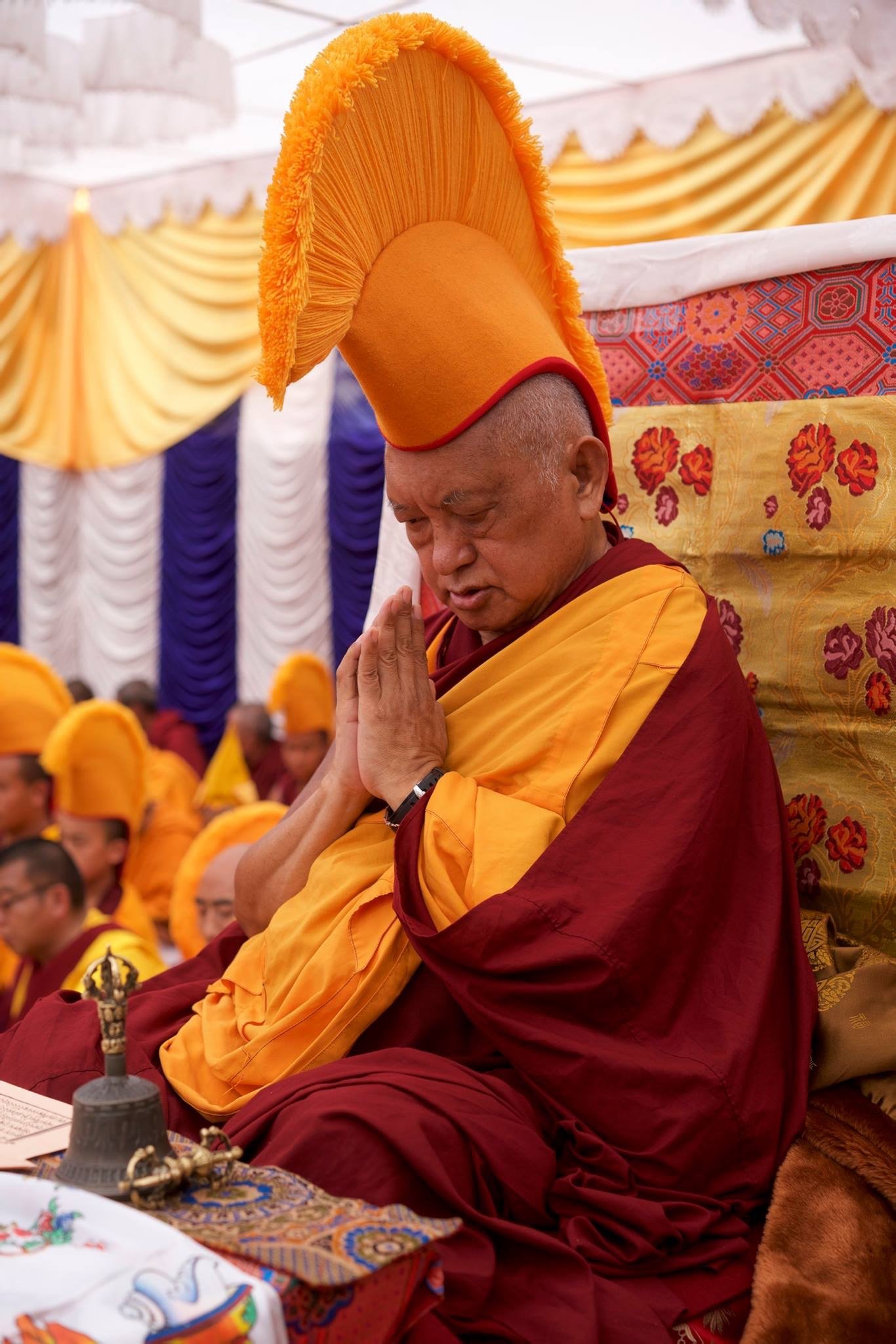 The happiest life is when your mind is living in the practice of bodhicitta, when your life is dedicated for sentient beings. When you have a realization of bodhicitta, not even an actual realization but just effortful bodhicitta, then not only meditation, practicing Dharma, but each step you take—during a pilgrimage or on a tour, for shopping, and so forth—each step you take toward the shop, each step you take back home, each step you take is for numberless sentient beings, not only for the people you love, not only for your boyfriend or girlfriend, but for numberless sentient beings: numberless hell beings, hungry ghosts, animals, human beings, suras and asuras, everyone.
The happiest life is when your mind is living in the practice of bodhicitta, when your life is dedicated for sentient beings. When you have a realization of bodhicitta, not even an actual realization but just effortful bodhicitta, then not only meditation, practicing Dharma, but each step you take—during a pilgrimage or on a tour, for shopping, and so forth—each step you take toward the shop, each step you take back home, each step you take is for numberless sentient beings, not only for the people you love, not only for your boyfriend or girlfriend, but for numberless sentient beings: numberless hell beings, hungry ghosts, animals, human beings, suras and asuras, everyone.
Not only those who are attached to you but also those who hate you or those who are strangers to you, each step you take is dedicated to every sentient being. Everything you buy you dedicate for all sentient beings. If you are buying vegetables, it is dedicated for every sentient being to achieve happiness and to achieve enlightenment.
When you talk to people, each word you say has the motivation of bodhicitta, so it benefits not only the person you are talking to but numberless sentient beings, helping them to achieve not just happiness but peerless happiness, enlightenment. Then, each time you eat food or drink something, every spoonful of food that is eaten with bodhicitta, every single bite of food or sip of drink is done to obtain happiness for numberless sentient beings, for others to be enlightened.
Then, when you finish the tea in the mug, however many sips of tea you have drunk, you have collected unbelievable merit, more than skies of merit. After you finish even one plate of rice or one bowl of soup, each time you eat with bodhicitta, you collect numberless merits, more than skies of merit, good karma, the cause of happiness, the cause of enlightenment. It is unbelievable, unbelievable. Each time you eat is for the benefit of sentient beings.
Similarly, how many hours you sleep, if your sleep is done with bodhicitta, however many seconds, minutes or hours you sleep you collect more than skies of merit all the time, continuously, dedicated for the numberless sentient beings to achieve enlightenment, not just temporary happiness, not just that, but the highest peerless happiness, the total cessation of all obscurations and the completion of all realizations. It’s incredible. And when you breathe, with bodhicitta each inbreath and outbreath is totally dedicated for sentient beings, for the numberless hell beings, hungry ghosts, animals, human beings, suras and asuras, for their happiness and enlightenment.
What you should aim to achieve in this life is to have a bodhicitta realization, the ultimate good heart. If you are smart then the goal you try to achieve in this life is enlightenment. Otherwise, even if you are able to actualize ultimate reality, emptiness only, you can only achieve liberation from samsara, nothing more than that, nothing higher than arhatship. You can’t achieve enlightenment. Without bodhicitta, no matter how many other realizations you have, enlightenment is impossible, Therefore, bodhicitta is so important.
There is a new book talking about the bodhicitta motivation [Bodhisattva Attitude]. Each time you enter the gompa or in relation to your daily activities, you should dedicate every action for sentient beings. That advice is not for those who have a realization of bodhicitta but for us without bodhicitta, to train the mind in bodhicitta. Maybe it is useful to read the book so everybody can try to practice during the course. Of course, you can practice when you are back in your country in your normal daily life, but also during retreats. Whenever you do a retreat in a group or alone it is good to do that; it brings you much happiness. You can see your life is dedicated for everybody, dedicated for the happiness of all sentient beings. The book is in English; maybe it is good to read it. That is good to use to practice with, to train the mind. Even with the breath you benefit numberless sentient beings, helping everyone achieve enlightenment. It’s incredible.
This teaching was given by Lama Thubten Zopa Rinpoche at the 50th Kopan Meditation Course, held at Kopan Monastery, Nepal, in Dec 2017. Transcribed and lightly edited by Ven. Joan Nicell. Second edit by Gordon McDougall. You can find more teachings from this course here on our website.
























